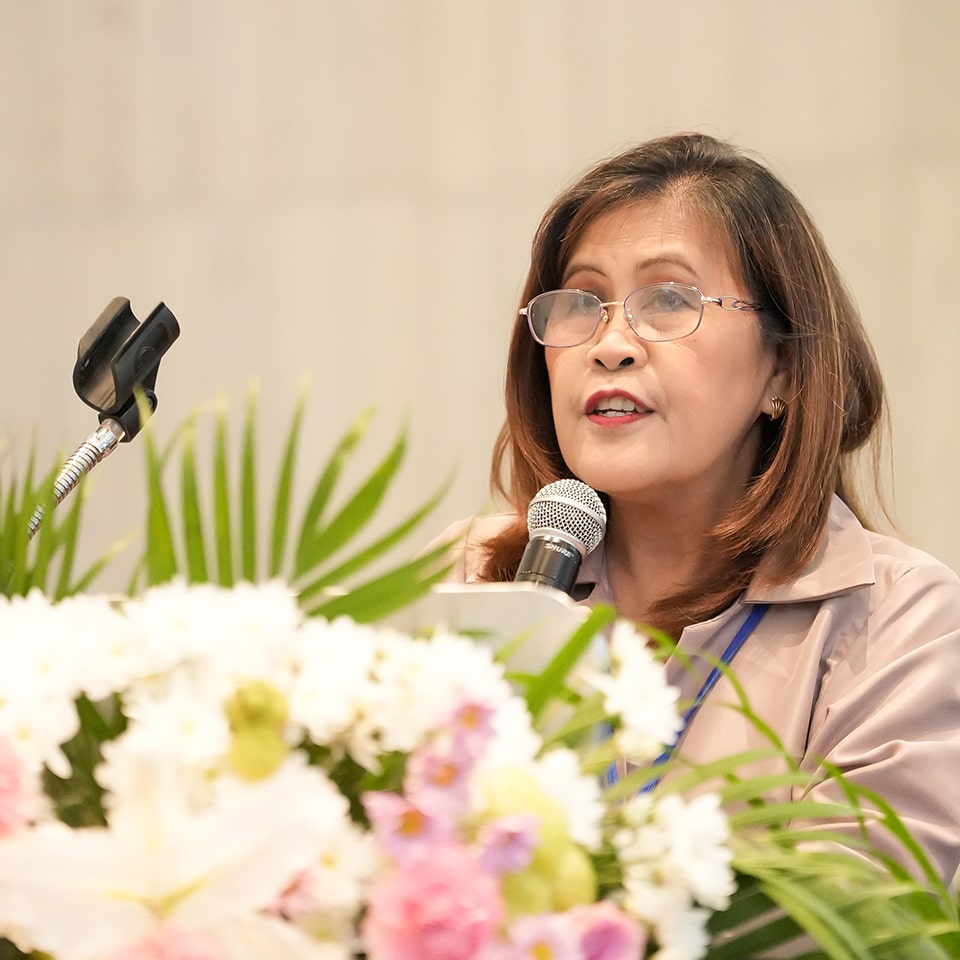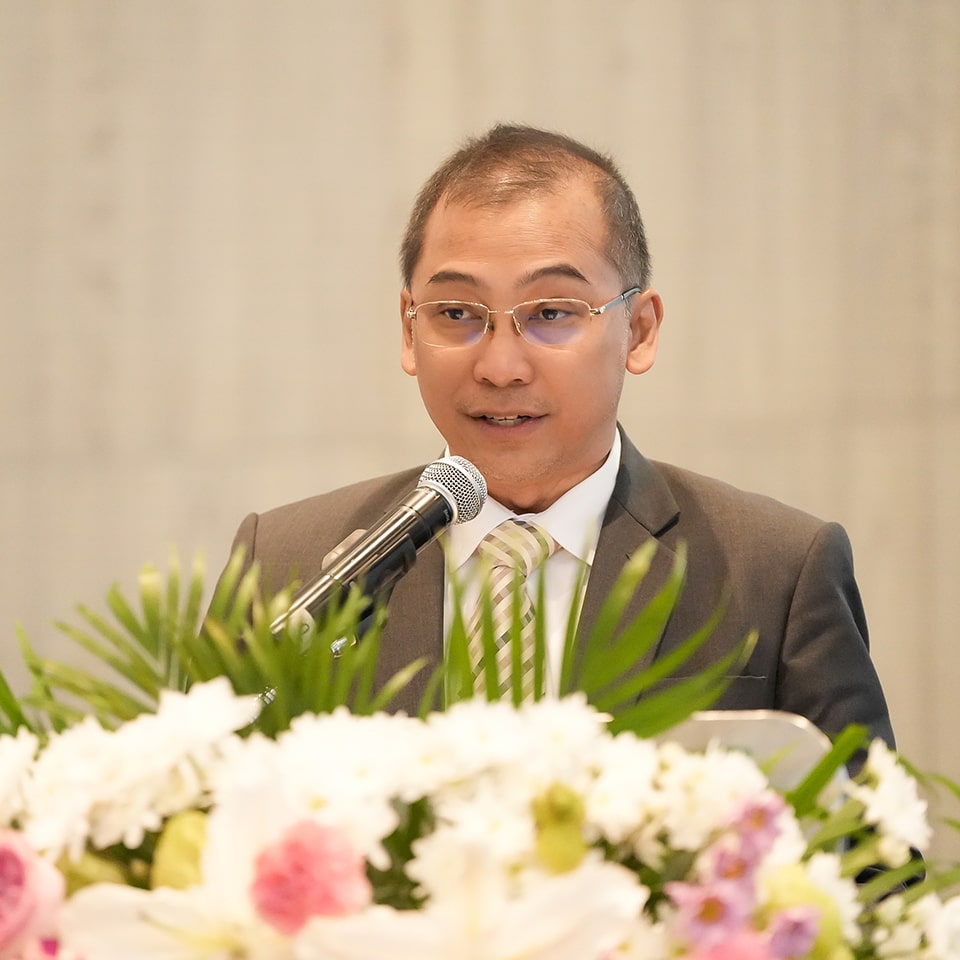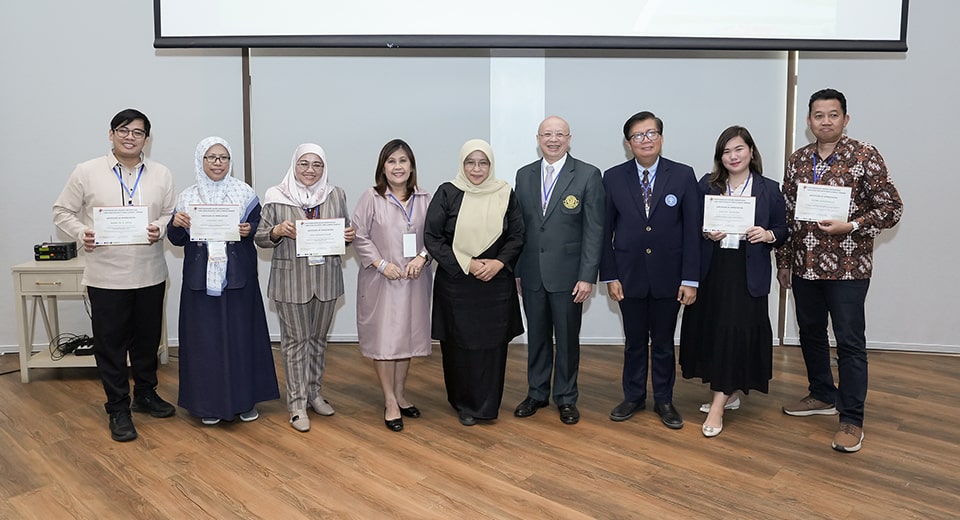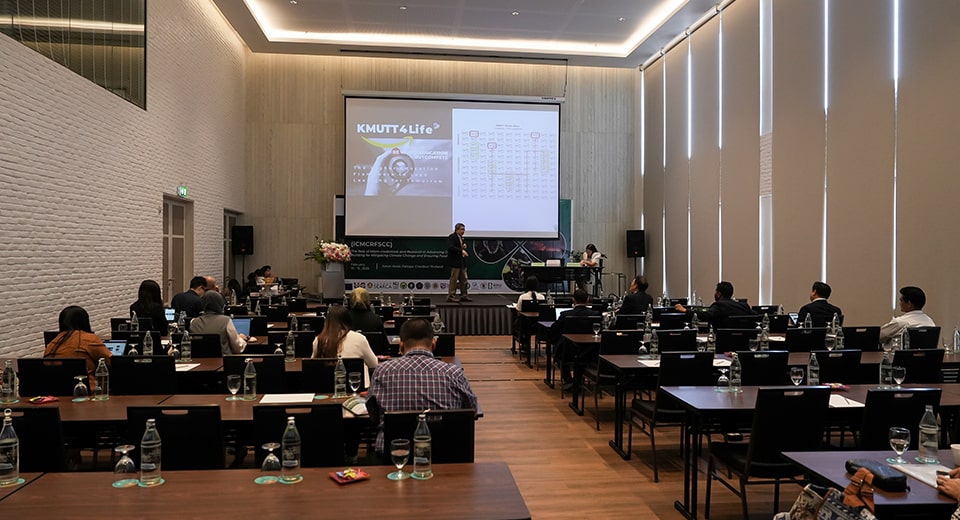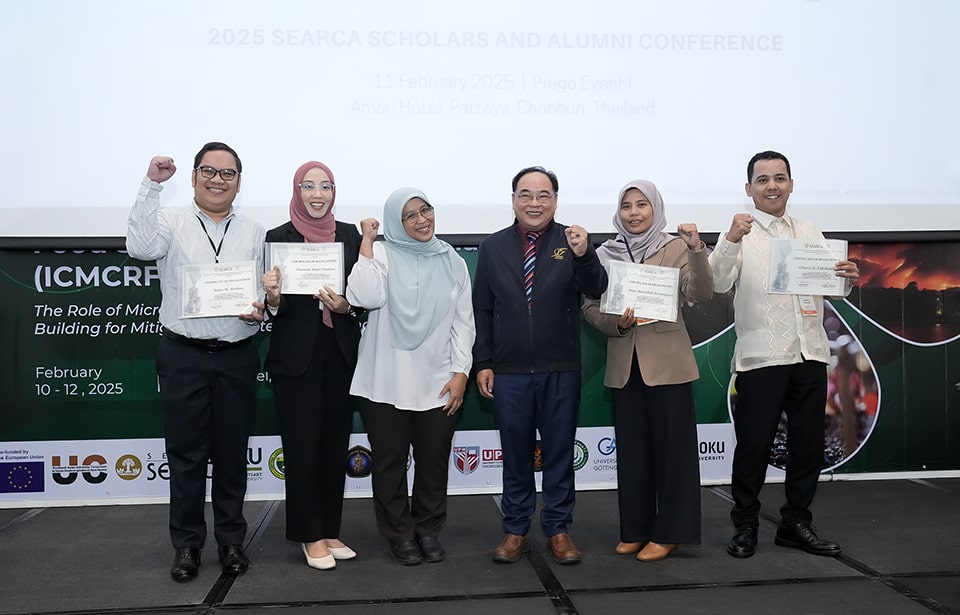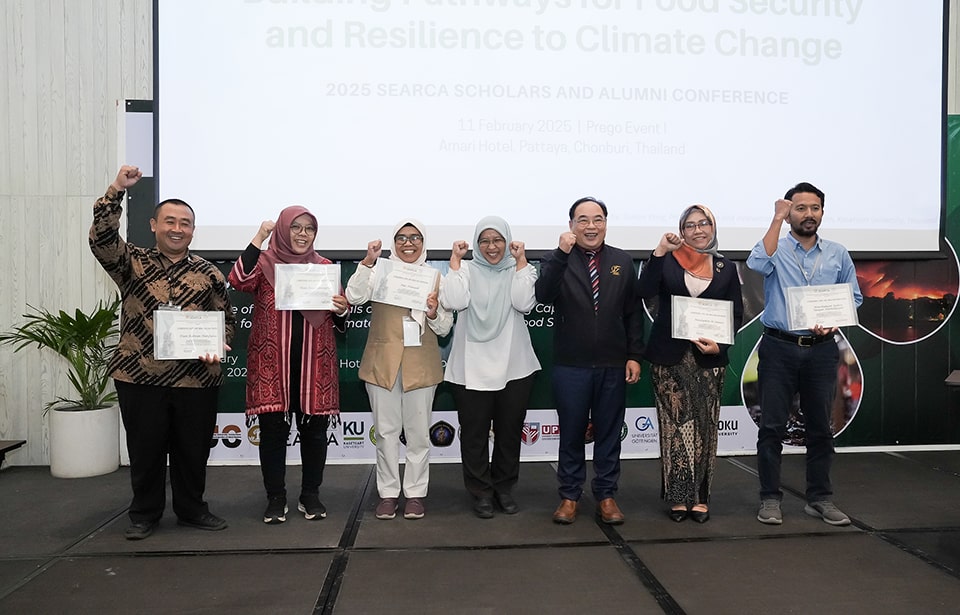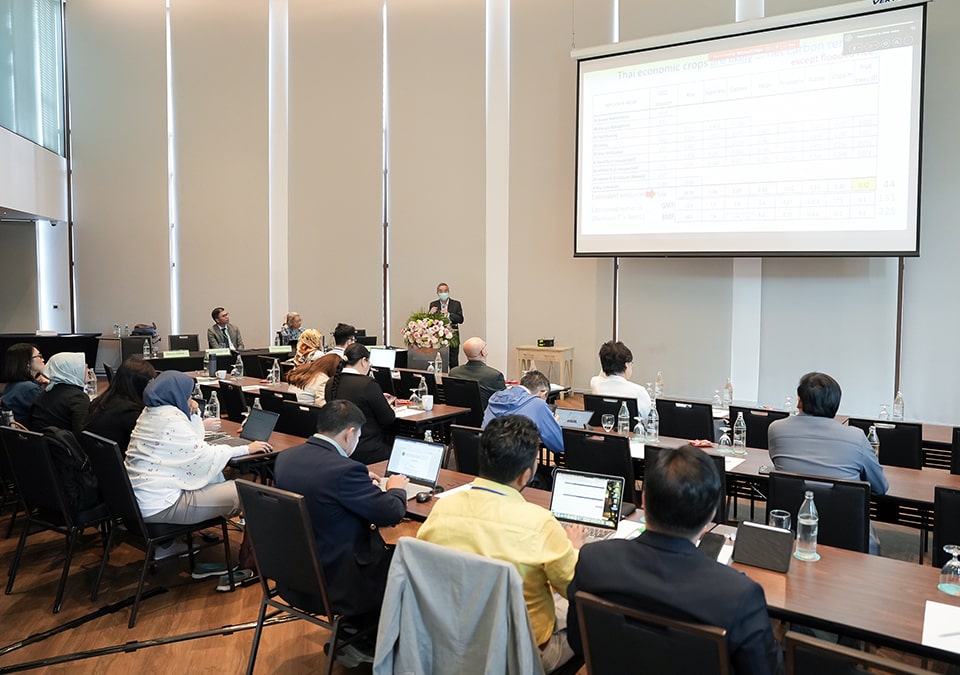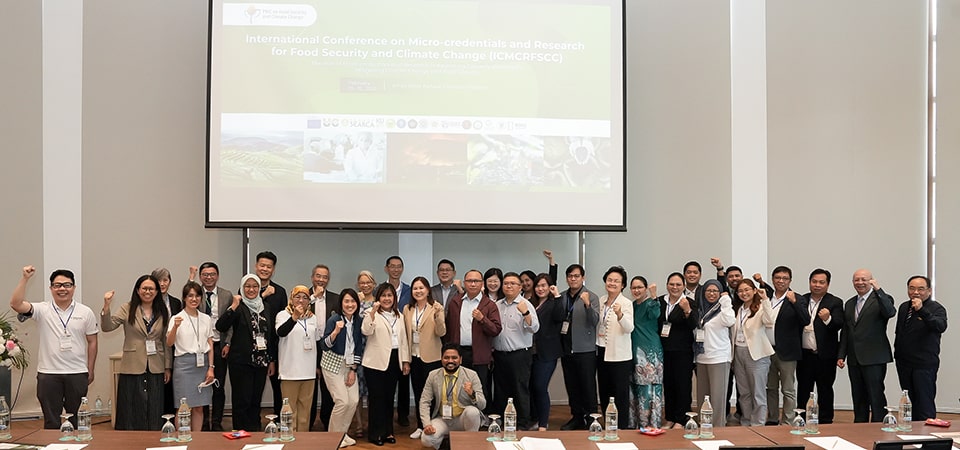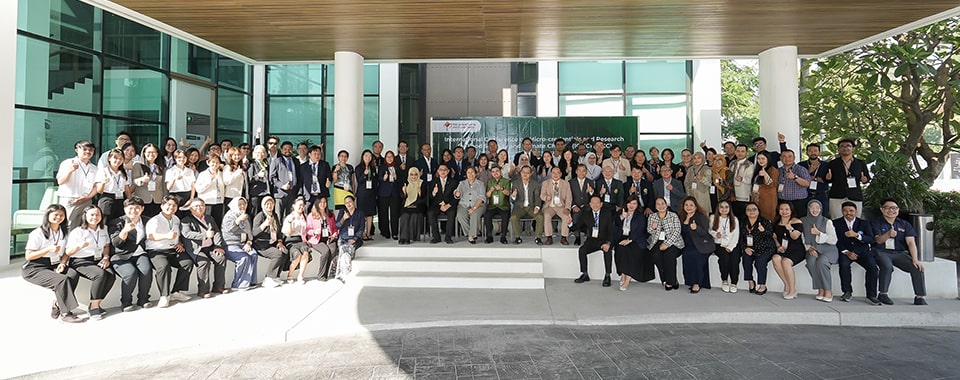 Delegates of the first International Conference on Micro-credentials and Research in Food Security and Climate Change
Delegates of the first International Conference on Micro-credentials and Research in Food Security and Climate Change
The ERASMUS+-funded program on Postgraduate Micro-credentials in Food Security and Climate Change (PMC FSCC) held its first international conference on 10–12 February 2025, at Amari, Pattaya, Chonburi Province, Thailand.
Themed "The Role of Micro-credentials and Research in Advancing Capacity Building for Mitigating Climate Change and Ensuring Food Security," the conference featured 29 research presentations on micro-credentials and research in food security and climate change resilience.
Kasetsart University (KU), as the PMC FSCC project leader, spearheaded the event in collaboration with Work Package 5 (WP5) on Communication and Dissemination managed by Institut Pertanian Bogor (IPB University), Central Luzon State University (CLSU), Universitas Brawijaya (UB), and Visayas State University (VSU). The Southeast Asian Regional Center for Graduate Study and Research in Agriculture (SEARCA) also co-organized the conference, hosting a back-to-back session with its scholars and alumni.
(L-R) Dr. Ravelina R. Velasco, Vice President for Academic Affairs of CLSU, and Assoc. Prof. Dr. Sathaporn Chuepeng, Vice President for KU-Sriracha Campus deliver the opening messages on behalf of the WP5 and overall project lead institutions.
The conference opened with welcome remarks from Dr. Ravelina R. Velasco, Vice President for Academic Affairs of CLSU, on behalf of University President Dr. Evaristo A. Abella, and Assoc. Prof. Dr. Sathaporn Chuepeng, Vice President for KU-Sriracha Campus, on behalf of Dr. Damrong Sripraram, Acting President of KU. Dr. Velasco underscored the collaborative spirit uniting institutions across Southeast Asia and acknowledged the key contributions of KU, SEARCA, IPB University, UB, VSU, and other partners in making the conference possible. She emphasized the role of micro-credentials and research-driven policies in fostering sustainable solutions for food security amid climate change. Likewise, she reaffirmed CLSU's commitment to agricultural research, innovation, and capacity building, highlighting the need for empowerment and regional cooperation.
During the plenary session, SEARCA Center Director Dr. Glenn B. Gregorio emphasized the importance of capacity building in food security and climate change adaptation, aligning with SEARCA's programs. On the other hand, Assoc. Prof. Witsanu Attavanich of KU provided insights into Thailand's food security challenges due to climate change and the necessary mitigation strategies.
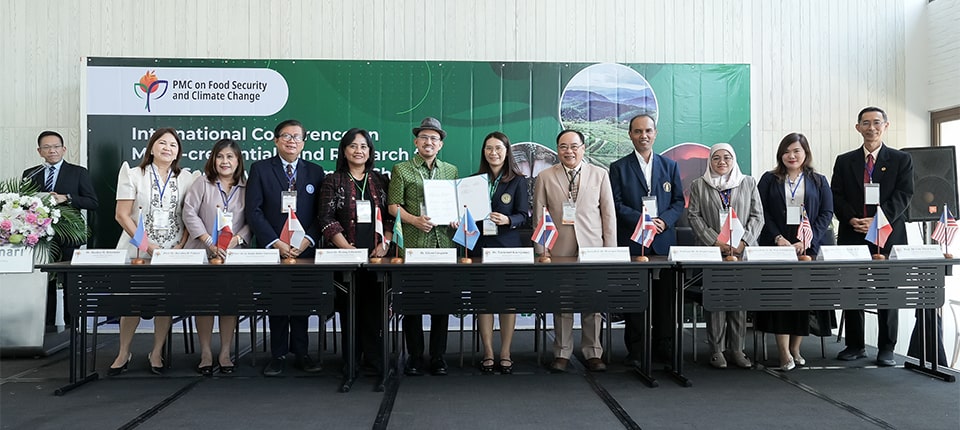 (L-R) Representatives from PMC FSCC project partner institutions VSU, CLSU, IPB University, UGM, SEARCA, KU, Maejo University, UB, UPM, UPLB, and UMS
(L-R) Representatives from PMC FSCC project partner institutions VSU, CLSU, IPB University, UGM, SEARCA, KU, Maejo University, UB, UPM, UPLB, and UMS
A highlight of the opening session was the ceremonial signing of the consortium agreement for the joint offering of micro-credentials in food security and climate change. This milestone solidified the commitment of partner institutions including IPB University, Universitas Gadjah Mada (UGM), and UB from Indonesia; Universiti Malaysia Sabah (UMS) and Universiti Putra Malaysia (UPM) from Malaysia; Maejo University and KU from Thailand; and the University of the Philippines Los Baños (UPLB), CLSU, VSU, and SEARCA from the Philippines to developing flexible, inclusive, and industry-responsive learning pathways in agriculture and climate change adaptation.
At the parallel session on "Curriculum Design, Regulation, and Quality Assurance," strategies were explored for integrating micro-credentials into academic curricula, with case studies from Malaysia, Indonesia, and the Philippines. Dr. Simone Pfeiffer from the University of Göttingen, Germany, provided insights into micro-credentials from a European and German perspective. Meanwhile, the session "Learning Instruments and Technology" focused on innovations in digital education and AI-powered agronomic tools. Assoc. Prof. Dr. Bundit Thipakorn from King Mongkut's University of Technology Thonburi discussed Thailand's digital badge development.
(L-R) Presenters and attendees in Session 1: Curriculum Design, Regulation, and Quality Assurance; and Session 2: Learning Instrument and Technology
The second day of the conference featured presentations from 13 SEARCA scholars and alumni as part of the 2025 SEARCA Scholars and Alumni Conference. Themed "Innovation Meets Education: Building Pathways for Food Security and Resilience to Climate Change," the event, held in partnership with the PMC FSCC Project and the Regional SEARCA Alumni Association (RSAA), reinforced SEARCA's commitment to education-driven solutions for climate challenges.
(L-R) Presenters for the sub-sessions on Agriculture and Food Security, Climate Change and Ecosystem Management, and Innovative Technologies and Sustainable Practices
SEARCA Center Director Dr. Glenn B. Gregorio opened the session, highlighting the synergy between micro-credentials (MCs) and problem-based learning in equipping professionals with industry-relevant skills. He also underscored SEARCA's initiatives, including the Seed Fund for Training and Research (i.e., SFRT) and Grants for Research towards Agricultural Innovative Solutions (i.e., GRAINS), as key mechanisms for impactful research and education.
The keynote address by Dr. Delfin J. Ganapin, Jr., an Outstanding SEARCA Scholarship Alumnus, emphasized the urgency of interdisciplinary research, policy advocacy, and innovative partnerships in addressing food security challenges. Dr. Ganapin championed the initiative to establish a Regional Challenges Corps, promoting regional collaboration to address shared challenges. By embracing the role of "puzzle solvers," SEARCA scholarship stakeholders can drive innovative solutions that create lasting impact. He emphasized the importance of supporting systems thinking and strategic mapping to enhance the effectiveness of research and education, ensuring they remain purposeful and responsive to real-world needs. Echoing the famous line, "With great power comes great responsibility," Dr. Ganapin urged both scholars and alumni to unite and become a collective force for positive change. He left them with a thought-provoking question: Are we ready to rise to the challenge and embrace the responsibility that comes with this power?
The session concluded with a call to action from RSAA Vice President and Maejo University President, Assoc. Prof. Dr. Weerapon Thongma, urging participants to translate insights into impact.
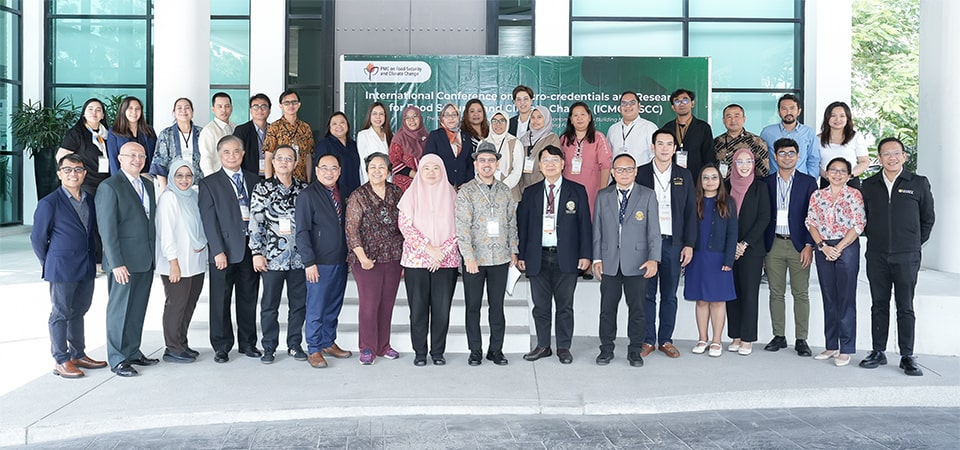 Delegates of the 2025 SEARCA Scholars and Alumni Conference
Delegates of the 2025 SEARCA Scholars and Alumni Conference
A special session, organized by KU and National Chung Hsing University (NCHU), Taiwan, focused on the topic "Carbon Credits and Climate-Neutral Agriculture." Discussions centered on the role of artificial intelligence (AI), carbon farming, and climate-smart policies in sustainable development. Prof. Cheng-Hsien Lin from NCHU delivered a talk titled "Net-Zero by Nature: Crafting Winning Strategies with Natural Carbon Sinks," complemented by KU presentations from Prof. Poonpipope Kasemsap "Agriculture for Carbon Neutrality and Food Security" and Prof. Simon Wang on "AI-powered Super Agronomist with a Climate Mind: Cases in Thailand and Beyond."
Session 3B on Carbon Credits in Agriculture, Climate Neutral, and Land-Climate Interactions (KU-NCHU) and Session 3C Current Studies and Research on Food Security and Climate Change
The final session "Current Studies on Food Security and Climate Change" showcased research on sustainable post-harvest strategies, crop adaptation to climate variability, and AI-driven food security solutions.
The PMC FSCC project's first international conference successfully advanced collaboration among the academe, researchers, and industry professionals to serve as catalyst for actionable solutions in food security and climate change resilience. By harnessing the power of research, education, and technological innovation, the event reaffirmed the project partners' commitment of offering micro-credentials toward a more sustainable and climate-resilient future.
(All photos in this article are courtesy of Kasetsart University.)
